
Most people use their cars without incident every day. Unfortunately, vehicle accidents happen all the time—even to the most attentive and cautious drivers. Fewer things are more tragic than a car accident that involves the loss of life. The victim’s family members must cope with the sudden and unexpected loss of their loved one, and the at-fault party wonders how this incident will impact the course of their lives. Suddenly, the future becomes uncertain, and they may fear that they will end up behind bars for years to come. However, before your mind jumps to the worst-case scenario, reach out to an experienced DUI homicide defense attorney who can help you understand your legal options. Whether Los Angeles County prosecutors are charging you with vehicular homicide, DUI homicide, or a related criminal offense, you can trust that your criminal defense lawyer will identify the most strategic path forward to keep your future as bright as possible. Let’s explore some of the subtle differences between vehicular homicide and DUI homicide charges in Los Angeles County and what steps you can take to maximize your chances of obtaining a fair and favorable outcome that keeps your legal rights intact at every turn.
DUI Incidents Causing Injury or Death in California
When a California law enforcement officer pulls someone over and tests them for driving under the influence (DUI) of drugs or alcohol, they may arrest them for having a blood-alcohol concentration (BAC) that exceeds the legal limit (0.08 percent). DUI charges that do not involve property damage, physical injuries, or death are typically considered misdemeanor offenses unless the defendant has previous DUI-related convictions on their record. However, if your DUI incident involved a fatality, you will likely face more serious charges. Depending on the specifics of your case, prosecutors may charge you with vehicular manslaughter while intoxicated or, in rarer cases, murder in the second degree (also known as “Watson Murder”). Let’s take a look at how California law defines each of these felony offenses.
Vehicular Manslaughter While Intoxicated
Even if you did not intend to take someone’s life, you may find yourself facing serious criminal charges for driving while intoxicated. Under California Penal Code Section 191.5(b), “vehicular manslaughter while intoxicated is the unlawful killing of a human being without malice aforethought, in the driving of a vehicle, where the driving was in violation of Section 23140, 23152, or 23153 of the Vehicle Code, and the killing was either the proximate result of the commission of an unlawful act, not amounting to a felony, but without gross negligence, or the proximate result of the commission of a lawful act that might produce death, in an unlawful manner, but without gross negligence.” In other words, if you engaged in negligent or unlawful behavior behind the wheel (i.e., you exceeded the posted speed limit or ran a red light) while under the influence of drugs or alcohol, and this behavior led to a fatality, you may face vehicular manslaughter while intoxicated charges. If prosecutors believe you acted with “gross negligence,” they may elevate the charges into gross vehicular manslaughter, which carries stricter penalties (i.e., years in state prison, costly fines, etc.).
Second Degree Murder (Watson Murder)
Second-degree murder, also called Watson Murder, is the most serious DUI charge a person can face under California law. This charge stems from a 1981 case known as People v. Watson, in which the California Supreme Court held that a DUI accident that results in a person’s death warrants a second-degree murder charge if the driver had knowledge of the dangerousness of driving while intoxicated. In order to secure a homicide conviction, prosecutors must establish that the defendant acted with “malice aforethought,” meaning that they knowingly committed the act. However, Section 188 of the California Penal Code states that malice may be expressed or implied and that “malice is implied when no considerable provocation appears, or when the circumstances attending the killing show an abandoned and malignant heart.” Even if you did not intend to take the life of another person, prosecutors may show that your previous DUI offenses and warnings from the court made you aware of the dangerousness of driving while intoxicated. For instance, if you were convicted of a DUI offense, the court will formally notify you that any subsequent DUI offense will put you at risk of a second-degree murder charge. Essentially, this official warning establishes that any subsequent acts of intoxicated driving constitute implied malice, as you have been made aware of the risks and dangers of this behavior. If convicted of Watson Murder, you could face a prison sentence of fifteen years to life, costly fines, restitution, and other lasting consequences.
Defending Yourself Against DUI Offenses in Los Angeles County
It’s natural to feel overwhelmed and frightened when law enforcement arrests you for DUI homicide or vehicular homicide. Suddenly, you face an uncertain future, and you worry that your life as you know it will be forever altered. However, before you assume the worst, exert your Constitutional right to contact a skilled and trusted criminal defense lawyer to discuss your case. Your attorney will assess the details of your situation and identify the most strategic path forward. You can trust that your lawyer will answer your questions, address your concerns, and work hard to keep your future as hopeful as possible. Whether you are facing a first-time DUI offense or you have a substantial criminal history, now is not the time to leave your future up to chance. Instead, enlist the services of a skilled and trusted Los Angeles County criminal defense lawyer to guide and support you during this challenging time.
The dedicated and experienced DUI homicide defense attorneys at Wegman & Levin are prepared to help you keep your future as bright as possible. Call (818) 980-4000 today to schedule your free consultation with a knowledgeable Los Angeles County criminal defense lawyer.

